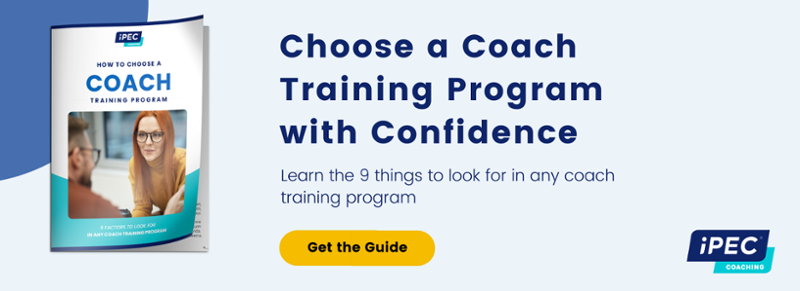The 3 W’s of Choosing a Professional Coaching Specialty
by Anna Brunmayr, CPC, ACC, ELI-MP
Jul 26, 2019 | 5 minutes read
Close your eyes and picture your ideal coaching client.
Is it a new mom looking to return to work after maternity leave? A young tech executive that wants to reach the next level in their organization? A couple looking for ways to heal their relationship? Someone struggling to adjust after an illness or reach specific health goals? An up-and-coming manager or team leader striving to improve corporate culture? Or is it simply a blank in your mind?
Sure, there are new coaches out there who already have an idea of whom they want to serve (and in what ways), but many others don’t even know where to start. Time and again, we hear prospective coaching students ask about choosing a professional coaching specialty, often to the tune of questions like:
- How important is it to define a focus?
- How do coaches select their area of specialization?
- Do I need to know my specialty before starting a training program?
- Is it essential to have in-depth training on a particular coaching niche?
- Who can help me figure out what type of coaching I’m best suited for?
- What if I just don’t know what I want my coaching specialty to be?
- Should my coaching niche be based on prior experience in a certain area?
- Can I still be successful with a specialty that’s unrelated to my current/past career?
- How long will it take to identify my ideal type of client?
If you find that you’re agonizing over these same or similar questions, here’s a helpful breakdown of the what, why, and when of choosing a professional coaching niche.
With these valuable insights, you can finally put this worry to rest and allow your journey to unfold.
WHAT is a professional coaching specialty?
In many respects, building a sustainable career in the coaching industry is less about “who you know” and more about “who knows you (and for what reason).” In other words, the best way to become a go-to coach—whether you’re aspiring to be an entrepreneur or an internal coach—is to become known for your expertise in a specific niche.
Think about it this way: When you have a specific health problem, you’re more likely to seek the professional expertise of a doctor who specializes in that particular area. Be it a pediatric dentist, orthopedic surgeon, sleep specialist, etc., their specialty is what enables them to understand (in a much more targeted way than a general doctor) what you’re going through.
Because they’re probably well trained in this area and immerse themselves in your specific type of challenge every day, you’re likely to feel a sense of security in their familiarity with your unique needs and their ability to find a solution quickly.
The same applies for coaches.
When someone has a specific challenge in life (e.g., a child with special needs, a broken relationship, a professional obstacle, etc.), that person wants to feel confident that their coach is uniquely dedicated to their distinct type of issue. They’re looking for a coach who focuses solely on people like them, facing their specific challenge. They want someone who’s passionate about this area and can help them identify and apply solutions quickly.
A professional coaching specialty is a way to clearly define the specific types of people you want to serve. In doing so, you'll be able to find these individuals more easily, speak to their unique challenges and needs, and communicate in a way that makes them feel particularly understood. That’s how they'll know you can help them, that they're in the right place!
Make no mistake: Choosing a coaching niche does NOT limit your options and potential clients.
It’s quite the opposite, actually. Specializing increases your effectiveness and attracts people who want to work with you, often elevating recognition of your name in the space you decide to embrace.
If you can imagine a coaching niche, it’s out there and waiting for you.
Some coaches use their prior experience in a specific industry or environment as a starting point, but you don’t have to feel tied down to that if you want to explore.
Other coaches have an awakening of hidden energy following a traumatic encounter or a life-changing event. Take, for instance, the survivor of a debilitating injury who works through their new challenges and comes out of the experience with a desire to help coach other struggling survivors navigate their new reality.
There are also many professional coaches who’ve hopped around from niche to niche, eventually finding that one in particular seems to stick with them.
The point? There are limitless possibilities to explore, and it’s up to you to decide the direction in which you want to go. Even if you don’t see that direction quite yet, it’s OK! Just know that it doesn’t have to be forced or stressful. It’s simply another part of the journey to self-discovery as a professional coach.
WHY is defining a professional coaching specialty valuable?
“Niche-ing down,” as they say, is one of the best actions you can take to ensure that your coaching sweet spot aligns with your audience’s needs, so you can more effortlessly propel your coaching practice forward.
When you declare the specific type of person you want to coach, the particular kind of problem(s) you want to help them address, and the certain form of outcome you want to help them achieve, you make it easier for people to understand the value of working with you.
You also give them a reason to automatically recommend you to others who could use your services.
Let’s refer back to the doctor analogy for a moment.
If you were to ask a doctor what they do for a living, and the response was, “I work in healthcare,” you’d probably give a nod of acknowledgement and move on.
If, on the other hand, they said, “Oh, I’m a doctor who offers a new sleep training option that enables new parents to finally get some rest,” you’d likely make an instant connection to someone in your life who could use that kind of service: “Wow, you HAVE to meet my sister. She and her husband have tried everything, and they haven’t slept in years! She NEEDS someone exactly like you.”
Often, specialists are perceived as authorities in their industry, can ask for higher rates, and run very full practices (if they are well-trained and known for providing solid results). Again, it’s no different for coaches. So it’s worth it to take the time to clarify whom you’re passionate about working with, and how to convey that message to others.
A coach is called to develop a collaborative relationship with each client.
Growing your practice can become so much easier when you naturally relate to and connect with your clients. When you think about this type of effortless connection, what types of people come to mind? You ideal niche, should be one that YOU would be delighted to support.
The most fulfilled professional coaches are the ones that have found their best type of clients by asking:
- Can I understand and relate to this person’s strengths and weaknesses?
- Am I excited to create a relationship with them?
- Do my natural tendencies line up with their needs?
When you align your joy to what your audience is already seeking, you can connect to a powerful synergy, which can strongly support the growth of your coaching practice.
WHEN do you need to decide on your niche?
Finding your niche (or, funny as it may sound, allowing your niche to find you!) doesn’t always happen overnight, or on a set, predetermined timeline. Some coaches know right away. Others need to explore.
Many start out in one area and change course as they learn about their coaching preferences over time. The when is not nearly as important as the simple, yet powerful act of starting the (sometimes winding and “imperfect”) exploration of finding your ideal niche.
Each coach’s process is different, and there’s no one “right” way.
Tina Quinn, CPC, ELI-MP, stumbled across her niche halfway through the iPEC coach training program when she had the opportunity to pick a specialty.
In a discussion with her teenage daughter, who has special needs and benefits from professional support in those areas, Tina was presented with a surprising request: “Mommy, will you work with parents of my friends?”
Tina’s immediate reaction was, “What does that mean? I’m horrible at being a parent for a special needs child. I don’t really know what I’m doing. Every day is new.” But her daughter’s response was both simple and profound: “They really need your help too. Will you just try?”
Since then, Tina has worked with families and individuals that have kids with special needs.
“These are people who I bring a light to,” she says. “They’re struggling, and I’m there to help them. Since that time, my daughter owns who she is even more, and so do I.”
The right coach training program will offer you training and techniques to masterfully work with any dream client you choose.
In the iPEC program, you’ll learn coaching techniques and tools that can be applied to anyone, with any challenge, at any point in their lives.
You’ll get to coach different types of peers, learn about various specialty tracks, and even take on paying clients after Module 1. Through this experience, you have an opportunity to consider whom you’ve enjoyed working with the most (and least) and use that information to find your sweet spot.


